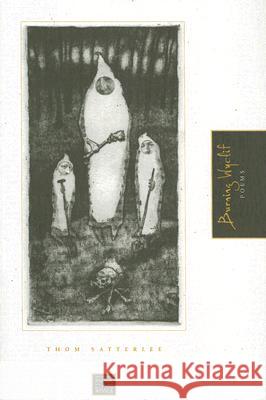Burning Wyclif » książka
Burning Wyclif
ISBN-13: 9780896725768 / Angielski / Twarda / 2006 / 96 str.
Probably the best book to come out this year. Not only is this the most beautifully bound book of poetry I think I ve ever seen, but Thom Satterlee is obviously a master at his craft. Suite101.com Thom Satterlee has fashioned a new genre, a contemporary hagiography in verse, primarily narrative but seasoned with lyric occasion. Burning Wyclif offers a deeply personal, word-savoring vision of a word-afflicted man, with the paradox and mystery one would expect of the life of a heretic and saint. Scott Cairns, author of Compass of Affection: New & Selected Poems For its lyrical but authoritative evocations of a passionate scholar s works and days, and for its formful penetrations into the Word itself the sound and sense/we made in that language/before languages Thom Satterlee s Burning Wyclif is a remarkable book, first or otherwise, inspired and earned. William Heyen"These poems shine with the desire of a medieval priest. How strange. Yet the book illuminates his conundrums so fiercely that they become ours. Thom Satterlee speaks through the character of Wyclif with such concentrated intelligence, passion, and humor that while I was reading, the historical man seemed to be standing in the room beside me." Jeanne Murray Walker Most of us recognize the name John Wyclif and associate it with the translation of the Latin Vulgate Bible into English. Admirers will add that Wyclif was one of the most prominent philosophers and theologians of the second half of the fourteenth century. Others will call him heretic for his condemnation of what he saw as corruption in the Catholic Church and especially for his attack on the Church s doctrine of transubstantiation. If we want to know the facts of Wyclif s life, we can consult an encyclopedia or biography. If we want to know John Wyclif, and maybe ourselves, we should read Thom Satterlee s poetry collection Burning Wyclif. Robert A. Fink, from the Introduction Burning Wyclif Sometimes you have to raise the body upto burn it down. So it was with Wyclif, who rested forty-two years under chancel stonecondemned by the Papacy, protected by the Crown.Finally, a bishop came with a few men, spades, shovels, a horse and cart. By then, not much was left of Wyclif hair and skin gone, his bones slipped out of place inside the simple albthey d buried him in. The bishop gathered what he could.Beside the River Swift, he lit a pile of woodand tossed the bones on one at a time, cursing the heretic from limb to limb.Afterwards, they shoveled ash into the waterand no one even thought the word martyr."











